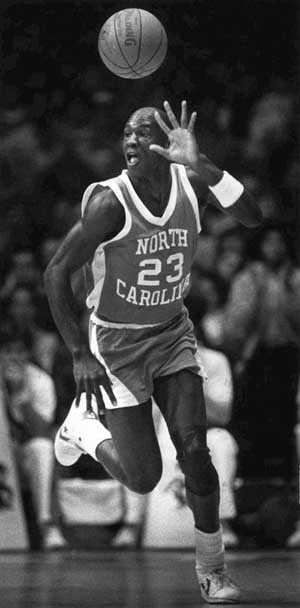
Michael Jordan
A Carolina Blue legend.
January 27, 1999

Michael Jordan
A Carolina Blue legend.
January 27, 1999
In the few weeks since Michael Jordan announced his retirement from the NBA, it seems every media outlet on the planet has scrambled not only to pay homage to Jordan's incomparable career, but also to place his cultural impact in some kind of historical perspective.
These tributes are not simply the result of Jordan's incredible feat of leading the Chicago Bulls to six titles in his last six (full) years on the court, and winning the Finals MVP award each time. More compelling than the championships themselves, or the league scoring titles, was the fact that Jordan so willingly took in all the hype surrounding him and somehow went out and exceeded it each season, each moment.
It seemed at times that Jordan was writing a novel or a screenplay, with the world as his audience, and now that he's written the final chapter of his own fantastic basketball story, we as fans are taking a collective deep breath to assess what it has meant to the game.
Jordan's three seasons at UNC have not been lost in this process. Indeed, between the Nike commercial which first aired the day of his retirement and the three-day Jordan marathon televised by ESPN Classic, I've seen replays of The Shot against Georgetown and The Dunk against Maryland more times in two weeks than in the previous fifteen years combined.
The Carolina years have become an essential part of the Jordan myth, largely because of Jordan's own desire to maintain ties to his alma mater. Has any other NBA superstar done so much to perpetuate his connection to the school where he played in college? One never got the sense that either Larry Bird or Magic Johnson, to name the two players most often cited in the same breath as Jordan in the "Greatest Player of All Time" arguments (which ended a couple of years back), felt a similar gratitude to Indiana State and Michigan State, respectively.
Jordan, on the other hand, never resisted an opportunity to credit the Carolina program, and specifically Coach Dean Smith, with helping him reach greatness. "Maybe I would still be a professional basketball player," he writes in the Foreword to Art Chansky's book The Dean's List, "but I am not sure how good I'd be or where I would be playing if I had not gone to Carolina and played for Dean Smith."
The fact that he always wore a pair of UNC practice shorts beneath his Bulls uniform became such a commonly known Jordan superstition that it was prominently featured in the movie Space Jam. And would Chicago's famous player introductions, now copied by half the teams in the NBA, be the same without the roar, and the chills, that always followed the words "And at guard, from NORTH CAROLINA?"
As Tar Heel fans, of course, we're well-versed at bragging that the greatest player of all time is part of the Carolina family. Now that the world is Jordan's practice tee, we'll have to adjust our focus a bit. We'll have to remind ourselves of the awe opposing players must feel when they first walk onto the Smith Center floor and look up into the rafters to see the retired number 23 jersey. Or the inherent recruiting advantage it continues to give the Tar Heel basketball program to have each and every rising prep star associate North Carolina with Jordan, and thus excellence. Or even the hope that we'll be lucky enough to have another once-a-millennium player come along who, like Jordan twenty years ago, possessed an uncompromising belief in his own ability and a passionate desire to learn the game at a University whose commitment to fundamentals, hard work and loyalty mirrors his own. It could happen -- a new millennium is about to begin, after all.
Before he was a basketball legend, the world's most ubiquitous salesman, and a cultural icon, Michael Jordan was a Tar Heel, bolting around the court in baby blue shorts whose minuscule length he had yet to make a fashion anachronism. It's true that other players in ACC history enjoyed more distinguished collegiate careers -- David Thompson, Ralph Sampson and Christian Laettner come to mind. Antawn Jamison, one could argue, had a greater three years at Carolina, particularly if one measures statistical performance. But none have gone on to achieve anything close to what Jordan has achieved professionally (Antawn's just getting started, but let's not burden him with that expectation).
And of the few NBA greats whose careers have approached Jordan's in terms of individual or team accolades, none have so publicly expressed such a tremendous debt to their alma mater, or so consciously used their fame to promote the school that gave him his start.
"I would never have been able to be the scorer, passer, rebounder, defender, or team player that I am without Coach Smith," Jordan says later in his Foreword.
More than any of his unparalleled achievements, we can take the greatest pride in the pride that Jordan himself continues to show towards North Carolina, the University as well as the basketball program. On behalf of Carolina fans everywhere, thanks for everything, MJ.
by Robert Peele